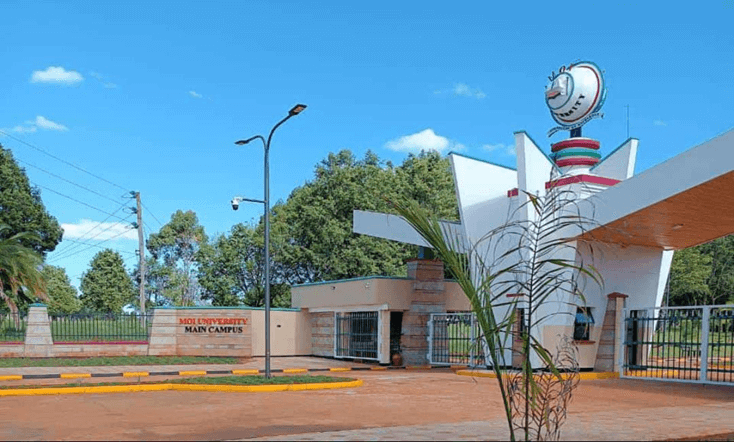

The Ethics and Anti-Corruption Commission has invited the Moi University Council members for interview and statement recording at the Commission’s Eldoret office.
EACC North Rift Regional Manager Charles Rasugu said they are undertaking an inquiry into 11 projects, worth Sh2bn, undertaken by the university
“To facilitate the investigation, kindly facilitate the listed university council members to attend interview and statement recording in respect of the matters under investigation at EACC Eldoret office,” Rasugu said.
The council chairman Dr. Humphrey K. Njuguna is supposed to appear on Wednesday, November 27 together with a member Prof. Clara Samiji Momanyi Member of the Council while Charles Obiero representing the Ministry of Education and Isaac Memusi representing Treasury will appear on Thursday, November 28.
So far, 59 persons of interest including Vice Chancellor Isaac Kosgey have recorded statements.
Kosgei was on November 20, grilled for more than 10 hours at the EACC offices in Eldoret.
“We came to shed light on the projects that are ongoing at the university. We have had very nice interactions. We have clarified issues and we say thank you to them for giving us a chance to clarify the issues,” Kosgey said after leaving the EACC offices.
He said he will soon invite the media to the university during which he will issue further clarification on matters affecting the institution.
The letter signed by Rasugu says the projects under investigation include the proposed construction of a school of public health, dentistry and nursing and related works for Sh726.4 million.
The second project is the proposed construction of Library Phase 11 at Annex Campus and its related works for Sh1.1 billion.
Another project is electrical installation at the School of Public Health and Dentistry at a cost of Sh148 million.
The fourth major project also under probe by the EACC is the electrical installation at the Library annexe at a cost of Sh169 million.
Several components of the same library project at the Annex Campus are under investigation by EACC, including the mechanical and air conditioning allegedly at a cost of over Sh35 million.
Another project is the construction of an amphitheater project at the main campus and also consultancy services for the various projects.
The outcome of the investigation will inform appropriate action against any persons found culpable, EACC said.
The Council on Tuesday moved to assure Kenyans that it
is committed to resolving the woes facing the troubled institution.
Chairman Njuguna, said the challenges cannot be
surmounted immediately, noting that ongoing engagements with various
stakeholders are designed to ensure the long-term stability and sustainability
of Moi University.
“These engagements need time to bear any fruit,”
Njuguna said in a statement to newsrooms.
He said the recent closure, the subsequent
reopening, and perceived uncertainty caused by staff industrial action are the
culmination of long-standing challenges faced by the university.
Njuguna said the major challenge at Moi
University is inadequate finances because the institution, for the past decade
or so, has not been able to raise revenues sufficient to meet the expenditures.
He explained that the inability to raise
adequate revenues is driven principally by two factors.
"First, there has been a progressive reduction in
government grants through guaranteed funding by way of capitation,” he said.
He said since the introduction of the
differentiated unit cost model of university funding, the government has
progressively reduced the capitation grants from an anticipated 80 percent of
the cost of an academic program to about 38 percent at the time of its
replacement.
“The 42 percent gap in revenue was supposed to
be met through internal revenues. The university relied on the privately
sponsored student programme to meet this gap. The 2016 KCSE reforms eliminated
this revenue stream, as all students who matriculated received government
sponsorship,” he added.
Second, the university has also witnessed a
significant decline in student enrolment in its undergraduate programmes that
form the bulk of its revenue base,” he said.
He noted that these programmes were either
government-sponsored or privately sponsored.
"For example, for the 2024-25 academic year,
about 6,000 first-year students were placed in the institution, as against a
declared capacity of over 14,000 students, and over 47,000 applicants to the
university's undergraduate programmes,” he explained.
The university thus has excess capacity to run
undergraduate programmes, and on realising this mismatch, the council engaged
the relevant government entities on modalities of utilising this excess
capacity,” he added.
Njuguna said solutions to the question are being
actively considered by the relevant agencies in government but can only be
implemented in the 2025-26 academic year.
He added that the mismatch in revenue and
expenditure created a difficult conundrum and compounded an increasingly dire
financial situation.
Njuguna pointed out that the university has
received assurances from the Ministry of Education, the National Treasury, the
Executive Office of the President, local leadership, and the National Assembly
Committee on Education that an initial financial support of about Sh3.5 billion
will be availed to meet the gap and other pressing challenges.
He added that reports suggesting that over Sh2.2
billion was squandered in capital development projects are inaccurate and
misleading.
He explained that the quoted amount is the total
cost of the projects under scrutiny, some of which have not kicked off and some
of which the requisite funding from the government has not been disbursed.
He said the council remains committed to the resumption of normalcy of the university academic calendar, and consultations are ongoing with staff unions for a mutually beneficial outcome that considers student welfare.
Additional reporting by Sharon Mwende.













